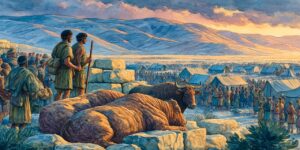
Peace
The gospel claims something bold: God offers real peace. Peace with Him, peace inside yourself, and peace with other people. But that peace isn’t automatic…

Now I rejoice in my sufferings for your sake, and in my flesh I am filling up what is lacking in Christ’s afflictions for the sake of his body, that is, the church, of which I became a minister according to the stewardship from God that was given to me for you, to make the word of God fully known, the mystery hidden for ages and generations but now revealed to his saints. To them God chose to make known how great among the Gentiles are the riches of the glory of this mystery, which is Christ in you, the hope of glory. Him we proclaim, warning everyone and teaching everyone with all wisdom, that we may present everyone mature in Christ. For this I toil, struggling with all his energy that he powerfully works within me.
Colossians 1:24-29
Paul writes to a church he has never visited, yet he sounds like a pastor who knows them well: he encourages, challenges, and points every road back to Christ. In Colossians 1:24–29, he offers a compact manifesto for Christian life and ministry. Here’s the heart of it—and how it lands for us today.
“I rejoice in my sufferings for your sake….”
Paul isn’t celebrating pain; he’s celebrating purpose. His hardships advance the gospel and strengthen Christ’s body. That is why he can rejoice in them, even if he would never rejoice because of them. Suffering, in God’s hands, becomes seed: it yields endurance, credibility, and compassion. Church history bears this out—opposition often purifies and multiplies the church rather than silences it.
For us: Don’t waste your pain. Ask, “Lord, how can this serve your people?” When hardship drives you deeper into prayer, patience, or solidarity with others, it hasn’t won—it’s been repurposed.
Paul calls himself a steward—someone entrusted with a task that serves the household. His charge is “to make the word of God fully known.” That is bigger than quoting verses; it means unfolding the whole counsel of God so people see how Scripture leads to, centers on, and flows from Jesus.
For us: If you belong to Christ, you’ve received a trust too. Your gifts, time, and story are not ornaments; they are instruments. Ask, “Where has God stationed me to make his word clear and beautiful?”
The “mystery hidden for ages” is not a puzzle for scholars; it’s a plan now unveiled: God’s salvation is for the nations, and its glorious riches are summed up in six words—“Christ in you, the hope of glory.”
Christ for you (the cross) secures your forgiveness.
Christ with you (his presence) anchors your courage.
Christ in you (by the Spirit) energizes your transformation and guarantees your future.
Who receives this? Paul says it’s revealed to the saints—not a spiritual elite, but all who are set apart by God’s grace. If you are in Christ, “saint” is not your résumé; it’s your new identity.
For us: Hope isn’t a mood; it’s a Person living within. Your future with God is not fragile because Jesus is not fragile.
“Him we proclaim, warning everyone and teaching everyone with all wisdom….”
Christian ministry has a rhythm:
Proclaim Christ plainly.
Warn honestly—about sin, idols, and counterfeits that hollow us out.
Teach patiently—truth that renews the mind and reshapes habits.
Do it with wisdom—the right truth at the right time in the right tone.
Notice Paul’s word “everyone” (three times). No one is beyond the need or the reach of this gospel.
For us: Let your conversations be Christ-centered, reality-based, and patient. Truth without love bruises; love without truth blurs. Wisdom marries both.
Paul aims “to present everyone mature in Christ.” The target isn’t mere activity, excitement, or even knowledge; it’s Christlikeness: resilient joy, holy loves, honest repentance, steady obedience. Maturity looks like people who can weather storms without losing hope, handle blessings without growing proud, and love others without growing cynical.
For us: Ask less, “Am I busy?” and more, “Am I becoming?” Practices that grow maturity—Scripture, prayer, gathered worship, serving, confession, communion—are not boxes to tick but means of grace that keep you close to the One who changes you.
“For this I toil, struggling with all his energy that he powerfully works within me.”
Paul is not a stoic. He labors hard, but not on his own steam. The same Christ who indwells us supplies strength for what he calls us to do. Grace does not make effort unnecessary; it makes it effective.
For us: Work faithfully, rest honestly, and depend constantly. Burnout often signals a power-source problem—doing God’s work without God’s strength.
Name your stewardship. Where has God placed you (family, workplace, neighborhood, church)? What small, concrete act could “make the word fully known” there this week?
Trade scripts. When hardship hits, replace “Why me?” with “How can this serve?” Pray for one person who might be helped by your experience.
Center your speech. In everyday conversation, practice the rhythm: proclaim Christ, warn wisely (about a real danger), and teach gently (share one truth that helped you).
Pursue maturity on purpose. Choose one habit that aims at Christlikeness (daily Scripture, weekly worship, serving, or confession to a trusted friend). Start small; be consistent.
Check your fuel. Begin tasks with a simple prayer: “Lord Jesus, I toil with Your energy. Work in me what pleases You.”
Bottom line: The Christian life is not genie-wishes and easy streets. It is Christ within, purpose in hardship, truth on our lips, maturity as our aim, and divine energy as our strength. That is a life worth living—and a church worth becoming.

The gospel claims something bold: God offers real peace. Peace with Him, peace inside yourself, and peace with other people. But that peace isn’t automatic…

Advent starts by asking us to slow down and look past the distractions. Every culture wraps Christmas in its own extras—traditions, shopping, decorations, sentimental ideas.

After Paul left Galatia, other teachers came. They questioned Paul’s authority and offered the Galatians a far more “comfortable” message…

Jesus leaves the synagogue in Capernaum and steps into a home. Simon Peter’s mother-in-law lies with a high fever.

Biblical hope isn’t wishful thinking or daydreams. It is a confident expectation anchored in what God has already done in Christ and what he has promised to complete…

The story of Jabesh-Gilead opens like a political crisis—but it carries deep spiritual meaning. After Israel had settled in the Promised Land, their incomplete obedience left enemy nations still scattered